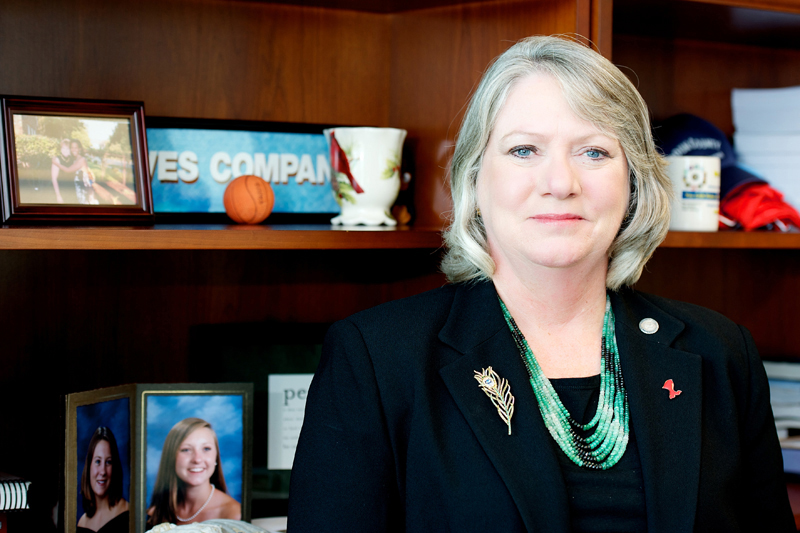Written by Alison Johnson
—
[dropcap]Last year, when Dr. Karen Remley was still State Health Commissioner, she assembled a standing desk in her Richmond office so she could do a little dancing while answering emails. Since resigning that post and taking a leadership position at Eastern Virginia Medical School last month, Remley has upped the calorie-burning ante a bit: she ordered a standing treadmill desk. [/dropcap]At 56, Remley believes in tapping all available resources to be as healthy as possible. She’s bringing that same vision to her new job as founding director of EVMS’ M. Foscue Brock Institute for Community and Global Health, which aims to connect medical students, residents and faculty even more closely with their surrounding communities.
The more doctors know about the populations they serve-—specific health data and trouble spots, cultural diversity and existing resources-—the better they’ll be at helping individual patients and planning outreach and service projects, says Remley, also an Associate Professor of Pediatrics and Health Professions.
“Our vision is to be the most community-oriented medical school in the country,” she says. “It’s about understanding what a community really needs and wants, versus what you just think is a good idea.”
An out-of-state medical student, for example, might not grasp how the region’s bridges and tunnels can impact where people want to go for care, or the issues that affect retired military populations. The institute, named for a well-loved community physician, aims to help EVMS target its clinical, research and education programs and student-led clubs to areas of greatest local need.
Remley has approached health care from many sides during her career, as an emergency room pediatrician at Children’s Hospital of The King’s Daughters, a hospital vice president, the medical director at an insurance company, a leader of two medical charities and, from 2008 to 2012, the state’s health commissioner, or principal advisor to the governor and legislature.
[quote]“Our vision is to be the most community-oriented medical school in the country,” she says. “It’s about understanding what a community really needs and wants, versus what you just think is a good idea.”[/quote]Last October, Remley stepped down over concerns about the politically-charged process to develop new regulations for the state’s abortion clinics. “It was the hardest decision I’ve ever made in my life,” she says, calling herself “humbled and honored” to hold the post. Highlights of her tenure include improved infant mortality and vaccination rates, narrowing health disparities between racial groups and stronger communication between public health leaders and doctors in private practice.
A native of Las Vegas, Nevada, where her father was stationed at Nellis Air Force Base, Remley earned her undergraduate and medical degrees from the University of Missouri-Kansas City and a Master of Business Administration from Duke University. She moved to Hampton Roads in 1991 to work at CHKD and teach at EVMS. “So now I’m back-—it’s like I took a very long sabbatical,” she says with a laugh.
Remley and her husband John Onufer, a cardiac electrophysiologist, have two daughters: Kathleen, 27, an urban planner in New Orleans, and Emily, 25, who’s a second-year medical student in Richmond. The couple still divides time between homes in Virginia Beach and Richmond, which means Remley has to work harder at her New Year’s resolution of building more physical activity into her day. She usually gets on a rowing machine for 30 minutes at 5:30 or 6 a.m., watching the sun rise and listening to National Public Radio, and tries to take 10,000 steps daily.
As for her mental health, Remley likes to read, garden and laugh with family and friends. Plus there’s her stress-busting office boogying—or, with the treadmill desk, walking and running—done to music mixes made by her daughters. And Remley also draws energy from her work.
“I’m so excited to continue my passion for uniting public health with clinical healthcare, and reaching young people just getting into the medical profession,” she says. “They’re not going to be in their 30s and 40s, still trying to figure out what their community looks like.”

